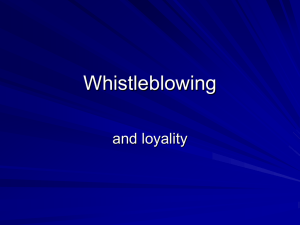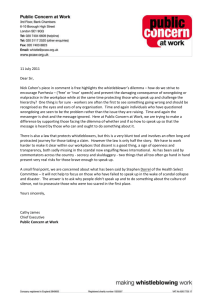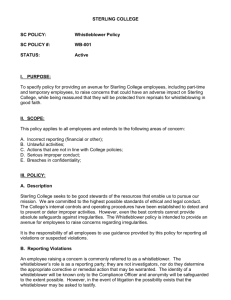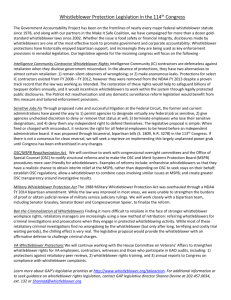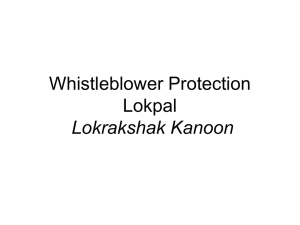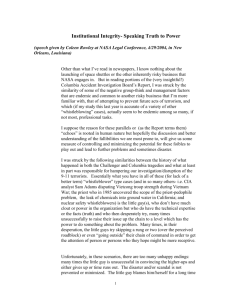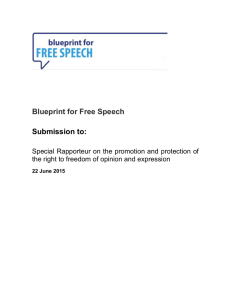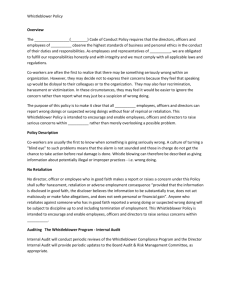Act CLXV of 2013 on Complaints and Public Interest Disclosures 1
advertisement
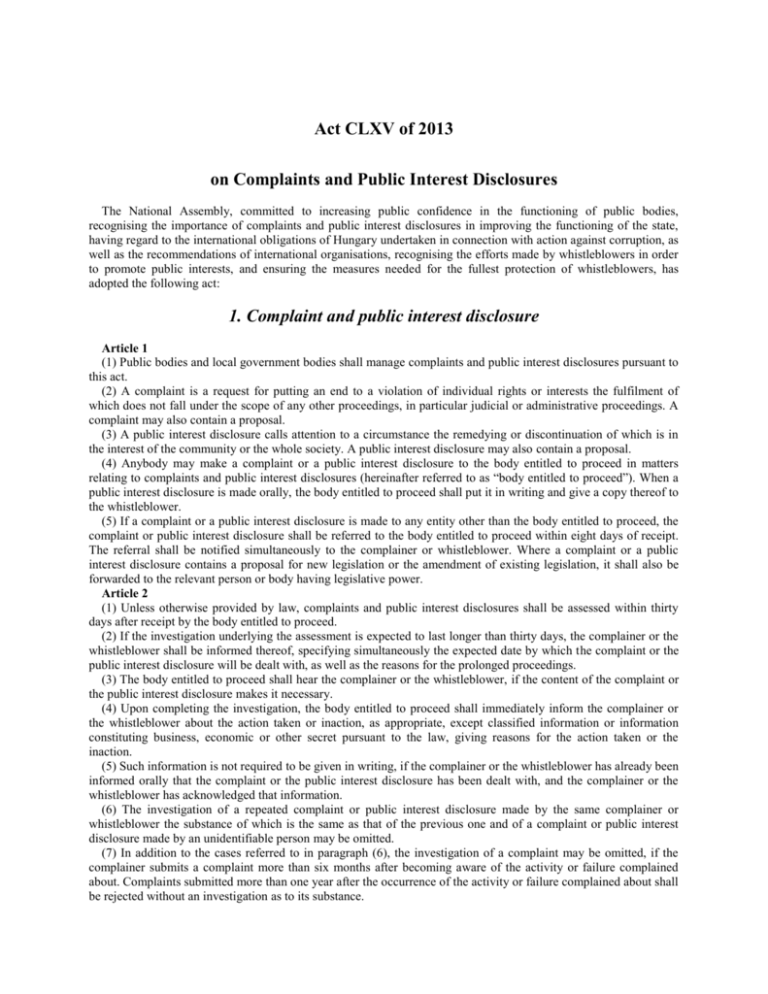
Act CLXV of 2013 on Complaints and Public Interest Disclosures The National Assembly, committed to increasing public confidence in the functioning of public bodies, recognising the importance of complaints and public interest disclosures in improving the functioning of the state, having regard to the international obligations of Hungary undertaken in connection with action against corruption, as well as the recommendations of international organisations, recognising the efforts made by whistleblowers in order to promote public interests, and ensuring the measures needed for the fullest protection of whistleblowers, has adopted the following act: 1. Complaint and public interest disclosure Article 1 (1) Public bodies and local government bodies shall manage complaints and public interest disclosures pursuant to this act. (2) A complaint is a request for putting an end to a violation of individual rights or interests the fulfilment of which does not fall under the scope of any other proceedings, in particular judicial or administrative proceedings. A complaint may also contain a proposal. (3) A public interest disclosure calls attention to a circumstance the remedying or discontinuation of which is in the interest of the community or the whole society. A public interest disclosure may also contain a proposal. (4) Anybody may make a complaint or a public interest disclosure to the body entitled to proceed in matters relating to complaints and public interest disclosures (hereinafter referred to as “body entitled to proceed”). When a public interest disclosure is made orally, the body entitled to proceed shall put it in writing and give a copy thereof to the whistleblower. (5) If a complaint or a public interest disclosure is made to any entity other than the body entitled to proceed, the complaint or public interest disclosure shall be referred to the body entitled to proceed within eight days of receipt. The referral shall be notified simultaneously to the complainer or whistleblower. Where a complaint or a public interest disclosure contains a proposal for new legislation or the amendment of existing legislation, it shall also be forwarded to the relevant person or body having legislative power. Article 2 (1) Unless otherwise provided by law, complaints and public interest disclosures shall be assessed within thirty days after receipt by the body entitled to proceed. (2) If the investigation underlying the assessment is expected to last longer than thirty days, the complainer or the whistleblower shall be informed thereof, specifying simultaneously the expected date by which the complaint or the public interest disclosure will be dealt with, as well as the reasons for the prolonged proceedings. (3) The body entitled to proceed shall hear the complainer or the whistleblower, if the content of the complaint or the public interest disclosure makes it necessary. (4) Upon completing the investigation, the body entitled to proceed shall immediately inform the complainer or the whistleblower about the action taken or inaction, as appropriate, except classified information or information constituting business, economic or other secret pursuant to the law, giving reasons for the action taken or the inaction. (5) Such information is not required to be given in writing, if the complainer or the whistleblower has already been informed orally that the complaint or the public interest disclosure has been dealt with, and the complainer or the whistleblower has acknowledged that information. (6) The investigation of a repeated complaint or public interest disclosure made by the same complainer or whistleblower the substance of which is the same as that of the previous one and of a complaint or public interest disclosure made by an unidentifiable person may be omitted. (7) In addition to the cases referred to in paragraph (6), the investigation of a complaint may be omitted, if the complainer submits a complaint more than six months after becoming aware of the activity or failure complained about. Complaints submitted more than one year after the occurrence of the activity or failure complained about shall be rejected without an investigation as to its substance. Article 3 (1) When a complaint or a public interest disclosure proves to be well-founded, the following shall be ensured: a) the lawful situation or the situation which meets the public interest is restored, and all otherwise necessary actions are taken; b) the reasons behind the detected deficiencies are eliminated; c) the caused injury is remedied; and d) prosecution is initiated, if warranted. (2) Except in the cases referred to in paragraph (4), complainers and whistleblowers shall not suffer any disadvantage for making a complaint or a public interest disclosure. (3) Except in the cases referred to in paragraph (4), the personal data of a complainer or a whistleblower shall not be disclosed to any recipient other than the body competent to carry out proceedings initiated on the basis of the respective complaint or public interest disclosure, provided that such body is entitled to process such data pursuant to the law, or the complainer or whistleblower has given explicit consent to the transfer of his or her data. Without such explicit consent, the personal data of the complainer or the whistleblower shall not be made public. (4) In cases where it becomes clear that a complainer or a whistleblower has disclosed untrue information of crucial importance in bad faith, and a) it gives rise to an indication that a crime or an offence has been committed, the personal data of the complainer or the whistleblower shall be disclosed to the body or person entitled to carry out proceedings; b) there is good reason to consider it likely that the complainer or the whistleblower caused unlawful damage or other harm to the rights of others, his or her data shall be disclosed upon the request of the body or person entitled to initiate or carry out proceedings. 2. Protected electronic system for public interest disclosures Article 4 (1) Public interest disclosures may also be made through a protected electronic system for public interest disclosures (hereinafter referred to as “electronic system”). The commissioner for fundamental rights shall ensure that an electronic system for making and recording public interest disclosures is operated. (2) The personal data processed in the electronic system shall not be used for any purpose other than the investigation of the relevant public interest disclosure and in contact with the whistleblower. (3) Unless otherwise provided in this chapter, the disclosure of personal data processed in the electronic system shall be governed by Article 3(3) and (4). (4) The identification data stored in the electronic system shall include the name and address of the whistleblower. Article 5 (1) The electronic system shall assign a unique identification number to each public interest disclosure received. (2) The commissioner for fundamental rights shall on the basis of the unique identification number make available to all on the Internet a brief summary of the substance, excluding personal and specific institutional data, and the status of each public interest disclosure made through the electronic system. When a case has been closed, the name of the entity involved in the public interest disclosure and, if different, the body entitled to proceed shall also be made available. (3) The electronic system shall be designed so as to enable contact with the whistleblower on the basis of the unique identification number and the password entered by the whistleblower. (4) The electronic system shall be designed so as to enable the whistleblower to print and record in electronic form the entire content of the public interest disclosure. Article 6 (1) Whistleblowers making a public interest disclosure to the commissioner for fundamental rights through the electronic system may request that their personal data are only made available to the commissioner for fundamental rights and the office of the commissioner for fundamental rights. (2) In the case referred to in paragraph (1), the commissioner for fundamental rights shall abridge the public interest disclosure in order to ensure that it does not contain any data that may enable the identification of the whistleblower. Article 7 Each public interest disclosure received through the electronic system or, in the case referred to in Article 6(1), an abridged version thereof, shall be forwarded to the body entitled to proceed. Article 8 The body entitled to proceed shall manage the public interest disclosure in the same manner as defined in chapter 1, except that: a) the body entitled to proceed shall record in the electronic system information about its actions or, where appropriate, information about omitting the investigation of the public interest disclosure pursuant to Article 2(6); b) in the case referred to in Article 6(1): ba) the whistleblower shall not be heard and informed orally; bb) the investigation of a public interest disclosure shall not be omitted on the grounds that the whistleblower cannot be identified by the body entitled to proceed; bc) contact with the whistleblower shall only be kept through the electronic system; bd) the body entitled to proceed may contact the whistleblower through the office of the commissioner for fundamental rights and may initiate contact with the whistleblower without revealing the identity of the whistleblower. Article 9 When a public interest disclosure concerns a natural person, the personal data of the whistleblower shall not be made available to any person seeking information in order to ensure the exercise of the rights of the natural person concerned to information about his or her personal data pursuant Article 15(1) of Act CXII of 2011 on the Right of Informational Self-determination and Freedom of Information (hereinafter referred to as “Information Act”). Article 10 The data recorded in the electronic system about public interest disclosures, the investigations carried out on the basis thereof and the actions taken shall be retained for a period of five years after the end of the last investigative act or measure and shall be deleted when that period has elapsed. 3. Protection of whistleblowers Article 11 With the exception of the actions referred to in Article 3(4), any action taken as a result of a public interest disclosure which may cause disadvantage to the whistleblower shall be unlawful even if it would otherwise be lawful. Article 12 (1) A whistleblower shall be at risk, except in the case referred to in Article 3(4), if the disadvantages threatening him or her as a result of the public interest disclosure he or she made are likely to seriously endanger his or her life circumstances, except in the case referred to in Article 3(4). (2) A whistleblower who is a natural person shall be entitled to aids provided to ensure the protection of whistleblowers, as defined in the relevant law, if he or she is likely to be at risk. (3) The state shall provide to whistleblowers the aids defined in Act LXXX of 2003 on Legal Aid, under the conditions defined in the same act. 4. Whistleblowing systems maintained by employers Article 13 Employers and the owners thereof operating in the form of a company (hereinafter jointly referred to as “employer organisation”) may define rules of conduct applicable to their employees under the conditions defined in Article 9(2) of Act I of 2012 on the Labour Code in order to protect public interest or overriding private interest, which rules together with a description of the related procedures must be published by employers so as to be available to anyone. Article 14 (1) Employer organisations may set up whistleblowing systems for reporting violations of the law and the rules of conduct referred to in Article 13 (hereinafter referred to “whistleblowing system”), in which they may process the personal data of whistleblowers and of persons affected by whistleblowing, as disclosed in the whistleblower reports, for the purpose of investigating whistleblower reports and may transfer such data to external organisations involved in the investigation thereof. Controllers shall notify the data processing operations relating to the whistleblowing system to the data protection register maintained by the National Authority for Data Protection and the Freedom of Information. Article 65(3)(a) of the Information Act shall not apply to the registration of data processing operations relating to the whistleblowing system into the data protection register. (2) Employers shall publish on their websites detailed information in Hungarian about the operation of their whistleblowing systems and their procedures relating to whistleblowing. (3) The processing of special data in a whistleblowing system is prohibited. (4) Data concerning third parties which are not needed for the investigation of whistleblower reports and cannot be processed under this act shall be deleted immediately from the whistleblowing system. (5) The processing of personal data in a whistleblowing system shall be governed by Article 3(3) and, with respect to the data of whistleblowers, Article 3(4). (6) Reports to such whistleblowing systems may be made by the employees of the employer, persons having a contractual relationship with the employer organisation and persons having a legitimate interest in making a whistleblower report or in remedying the conduct concerned. When making a whistleblower report, the whistleblower shall disclose his or her name and address, and a whistleblower who is a legal person shall disclose its registered address and the name of the legal representative of the whistleblower, and it shall declare that the whistleblower report is made in good faith about circumstances it is either aware of or has a good reason to believe that they are real. Whistleblowers shall be reminded of the consequences of whistleblowing in bad faith, the rules governing the investigation of whistleblower reports, and the fact that the identity of the whistleblower shall be treated confidentially in all stages of the investigation. Whistleblowers shall be informed that the investigation of a whistleblower report made by an unidentifiable person may be omitted. Article 15 (1) Employers shall investigate all whistleblower reports and shall inform the whistleblower of the outcome of the investigation and the action taken. The investigation of a repeated whistleblower report made by the same whistleblower the substance of which is the same as that of the previous one and of a whistleblower report made more than six months after becoming aware of the activity or failure complained about or a whistleblower report made anonymously or by an unidentifiable whistleblower may be omitted. If the prejudice to public interest or overriding private interest is not proportionate to the limitation of the rights of the person concerned, the employer may omit the investigation of the whistleblower report. (2) Whistleblowing systems shall be designed so as to ensure that the whistleblower can be identified by nobody but those who investigate the whistleblower report. Until the investigation is closed or formal prosecution is initiated as a result of the investigation, those who investigate the whistleblower report shall keep secret all information about the substance of the whistleblower report and the persons concerned and, with the exception of informing the person concerned, shall not share such information with any other organisational unit or employee of the employer organisation. (3) When opening an investigation, the person concerned shall be informed in detail about the whistleblower report concerning him or her, as well as his or her rights pursuant to the Information Act and the rules governing the processing of his or her data. Observing the requirement of fair proceedings, the person concerned shall be given an opportunity to state his or her views on the whistleblower report and to provide supporting evidence either directly or through a legal representative. In exceptional and justified cases, the person concerned may be informed later, if immediate information would jeopardise the investigation of the whistleblower report. Article 16 (1) Whistleblower reports may be received or investigated by a lawyer engaged for the protection of whistleblowers. Data may be transferred to a foreign country, if the data controller or the data processor undertakes a contractual obligation to comply with the rules of the Hungarian law concerning whistleblowing, and an adequate level of protection for the personal data transferred or exported for processing by a data processor in a third country is ensured in accordance with Article 8(2) of the Information Act. (2) Employers shall investigate whistleblower reports as soon as possible under the given circumstances. Whistleblower reports shall be investigated within 30 days after receipt, which time limit shall only be subject to derogation in cases where it is highly justified, provided that the whistleblower is simultaneously informed, except where the whistleblower report was made anonymously or by an unidentifiable whistleblower. The investigation shall not last longer than 3 months. (3) If the investigation of the conduct reported by the whistleblower warrants the initiation of criminal proceedings, arrangements shall be taken to ensure that the case is reported to the police. (4) If the investigation reveals that the conduct reported by the whistleblower is not a crime but it constitutes a breach of the rules of conduct defined by the employer organisation, the employer may impose sanctions on the employee concerned in accordance with the rules governing the employment relationship. (5) If the investigation reveals that the whistleblower report is unfounded or that no further action is necessary, the data relating to the whistleblower report shall be deleted within 60 days after the end of the investigation. (6) In the event that any action is taken on the basis of the investigation, including action due to legal proceedings or disciplinary action launched against the whistleblower, the data relating to the whistleblower report may be processed in the employer’s whistleblowing system until the closure of the proceedings launched on the basis of the whistleblower report becomes final. 5. Lawyer for the protection of whistleblowers Article 17 (1) A legal person that is not a public body or a local government body may conclude an engagement contract for non-employee services with a lawyer for receiving and managing whistleblower reports relating to the activities of that legal person (hereinafter referred to as “lawyer for the protection of whistleblowers”). For the purposes of the activities of the lawyer for the protection of whistleblowers, all indications of circumstances the remedying or discontinuation of which are in the legal or lawful business interest of the legal person or contribute to putting an end to an infringement or to a threat to public security, public health or the environment occurring in relation to the activities of the legal person shall be whistleblower reports. (2) The engagement contract referred to in paragraph (1) shall not be concluded with a legal person with whom the lawyer for the protection of whistleblowers has or had in the five-year period preceding the conclusion of the engagement contract any other engagement or employment relationship or other legal relationship involving work obligations. When a whistleblower report concerns an act or omission by a senior executive of the contracting party, the lawyer for the protection of whistleblowers shall immediately inform about the whistleblower report the supervisory board and auditor of the whistleblower and the supreme decision making body of or the entity exercising ownership rights over the contracting party. (3) The lawyer for the protection of whistleblowers shall not request or accept from any entity other than the contracting party any remuneration or other benefit associated with these activities. (4) The lawyer engaged for the protection of whistleblowers shall within 15 days notify in writing the conclusion of the engagement contract to the bar of the district concerned. The name, address, telephone number, e-mail address and website details of the lawyer for the protection of whistleblowers shall be published on the website of the bar of the district concerned. Article 18 (1) Under the engagement contract referred to in Article 17(1), the lawyer for the protection of whistleblowers: a) shall receive whistleblower reports relating to the activities of the contracting party; b) shall provide legal advice to whistleblowers on whistleblowing; c) shall keep contact with whistleblowers and may request information and clarification, where necessary, for the investigation of whistleblower reports; d) may, according to the instructions of the contracting party, make a contribution to the investigations carried out on the basis of whistleblower reports; e) may, upon request, inform whistleblowers in writing about the events relating to their respective whistleblower reports, in particular the outcome of the investigation launched on the basis of the whistleblower report, the action taken by the contracting legal person, or the rejection of investigation. (2) The lawyer for the protection of whistleblowers shall forward whistleblower reports to the contracting legal person but shall have a confidentiality obligation with respect to the data enabling the identification of the whistleblower and therefore shall only send to the contracting party an abridged version of each whistleblower report, which shall not contain any information that would enable the identification of the whistleblower, unless the whistleblower concerned has given a prior waiver of confidentiality in writing. (3) The lawyer for the protection of whistleblowers shall ensure that the whistleblower reports received in such capacity and the associated files are managed and recorded separately from other activities. (4) The engagement contract of the lawyer for the protection of whistleblowers shall not be terminated without giving reasons. Lawful proceedings carried out by the lawyer for the protection of whistleblowers cannot lead to termination by the contracting party or the refusal of the payment of the fee due to the lawyer for the protection of whistleblowers by the contracting party. 6. Final provisions Article 19 The minister responsible for justice shall be empowered to adopt a decree on the aids available to whistleblowers at risk and the rules governing the disbursement thereof. Article 20 This act shall enter into force on 1 January 2014. Article 21 (1) The following chapter 11/A shall be added to Act CXI of 2011 on the Commissioner for Fundamental Rights (hereinafter referred to as “Act on the Commissioner for Fundamental Rights”): “11/A. Investigation of public interest disclosures Article 38/A The commissioner for fundamental rights shall monitor the practice of managing public interest disclosures within the meaning of the Act on Complaints and Public Interest Disclosures by the authorities referred to in Article 18(1)(a) to (k) and, upon request, whether certain public interest disclosures are dealt with appropriately. Article 38/B (1) The commissioner for fundamental rights shall ensure that an electronic system for making and recording public interest disclosures (hereinafter referred to as “electronic system”), as referred to in the Act on Complaints and Public Interest Disclosure, is operated. (2) To the extent needed for the performance of the duties of the commissioner for fundamental rights, the authorities referred to in Article 18(1)(a) to (k) shall report data relating to public interest disclosures made through the electronic system and the investigation thereof. Article 38/C The whistleblower may submit a petition to the commissioner for fundamental rights in order to seek remedy for the alleged abuse, if: a) the body entitled to proceed referred to in the Act on Complaints and Public Interest Disclosures (hereinafter referred to as “body entitled to proceed”) declares the public interest disclosure to be unfounded; b) the whistleblower disagrees with the outcome of the investigation, c) the whistleblower is of the view that the body entitled to proceed failed to fully investigate the public interest disclosure. Article 38/D The personnel of the Office performing tasks associated with the direct investigation of public interest disclosures shall perform such tasks in positions subject to national security control, holding personnel security clearance.” (2) Article 40(2)(a) of the Act on the Commissioner for Fundamental Rights shall be replaced by the following: (In the annual report, the commissioner for fundamental rights shall) „a) describe his or her activities in the field of protecting fundamental rights, devoting specific chapters to the activities referred to in Article 1(2) and (3) and the activities relating to the investigation of public interest disclosures,” Article 22 The following point (j) shall be added to Article 5(3) of Act XI of 1998 on Lawyers: (In addition to those listed in paragraph (1), lawyers could perform the following activities:] “j) activities of a lawyer for the protection of whistleblowers.” Article 23 Article 29/A of Act CLIV of 1997 on Health shall be replaced by the following: “Article 29/A Concerning the healthcare services provided by healthcare service providers to patients, complaints within the meaning of the Act on Complaints and Public Interest Disclosures may be submitted to the healthcare administration body entitled to grant an operating licence to the healthcare service provider concerned.” Article 24 Article 168(17) of Act LXXXVI of 2007 on Electricity shall be replaced by the following: “(17) In the course of its proceedings, with respect to complaints and public interest disclosures, the Office shall act in accordance with the provisions of the Act on Complaints and Public Interest Disclosures, except that the time limit for assessment shall be three months.” Article 25 In Article 10 of Act CXLIII of 2011 promulgating the Optional Protocol to the Convention against Torture and other Cruel, Inhuman or Degrading Treatment or Punishment, the provision enacting Article 40(2)(a) of the Act on the Commissioner for Fundamental Rights shall enter into force with the text “referred to in Article 2(6) and relating to the investigation of public interest disclosures” instead of the text “and referred to in Article 2(6)”. Article 26 In Article 94/A of Act LVII of 1996 on the Prohibition of Unfair and Restrictive Market Practices, the text “Articles 141 to 143 of Act XXIX of 2004 Amending Certain Acts and Repealing and Enacting Certain Legal Provisions in Relation to Accession to the European Union” shall be replaced by “the provisions of the Act on Complaints and Public Interest Disclosure”. Article 27 The following shall be repealed: a) the chapter “Public interest petitions, complaints and disclosures” and Articles 141 to 143 of Act XXIX of 2004 Amending Certain Acts and Repealing and Enacting Certain Legal Provisions in Relation to Accession to the European Union, and b) Act CLXIII of 2009 on Safeguarding Fair Proceedings and the Related Legislative Amendments.
